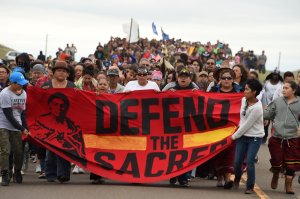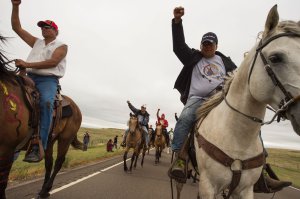On Dec. 4, hundreds of veterans plan to “deploy” to Standing Rock Indian Reservation in North Dakota to join in protest against the planned Dakota Access Pipeline.

The event, Veterans Stand for Standing Rock, is a call for veterans to “assemble as a peaceful, unarmed militia” to “defend the water protectors from assault and intimidation at the hands of the militarized police force and DAPL security.” The organizers hope to prevent progress on the construction of the pipeline as well as draw national attention to the cause.
If built, the $3.7 billion pipeline would carry 470,000 barrels of crude oil a day through North Dakota, South Dakota, Iowa and Illinois. Proponents say the pipeline would significantly decrease U.S. reliance on foreign oil. Opponents say it would destroy culturally significant Native American land and have environmental impacts, including potential water contamination and greenhouse gas emissions.
The Standing Rock Sioux Tribe and its supporters have been protesting the project for months. The protests have been largely peaceful but turned violent on Sunday. Support has flooded in from all over the country on social media under the hashtag #NoDAPL.
In 10 days, the GoFundMe for the veterans’ event has raised $43,870 of the $100,000 goal. The money will go toward food, transportation and supplies for the veterans who attend. “It’s time to display that honor, courage and commitment we claim to represent,” the page reads. “It’s time for real patriots. Now more than ever, it’s time for anyone and everyone to lead.”
Leading the troops
Wesley Clark Jr., a veteran, screenwriter and activist, created the event along with Michael Wood Jr., a retired Baltimore police officer and Marine Corps veteran who advocates for police reform.
“I’m going for religious reasons. I’m not a leader. I’m not in charge. We are self-organizing this,” Clark said. They are hoping for a turnout of 500, but, “if we only have 20 or 30, that’s what God provides us,” he said.
Clark decided to take action after an elder from Standing Rock called him about the protests. “When she described what was going on, it brought tears to my eyes,” he said. “People are concerned about the way the elders who are praying are being brutalized, and what we are doing to the planet.”
Wood said, “If we don’t stand up for the oppressed, that’s the snowball that starts that leads to everyone else’s oppression.
“It doesn’t matter if you are a libertarian, a conservative, or a progressive, this is everyone’s fight,” he said.

Protection for all Americans
Veterans will be making the trek from all over the country to attend. Jade Emilio Snell, a veteran of the Marine Corps, will be attending on behalf of the Rocky Mountain Tribal Leadership Council, which is dedicated to improving health, economic development, and education for tribes in the Rocky Mountains.
“I’ve been watching the news, how they’re spraying everybody and using rubber bullets, and these guys are fighting for what they believe in and as a veteran we took an oath,” he said. “We’re not just there to protect Americans in foreign countries. We’re here to protect this country inside of it, too.”
Snell said he is not against the pipeline project, but opposes how it is being executed. “I believe in the pipeline but not how they are doing it. They don’t have to go under the water. There are a lot of other options,” he said. “It’s about protecting Americans. If that pipeline bursts, it will affect our culture, our drinking water, everything.”
Remaining peaceful
On the event’s Facebook page, organizers told attendees: “Bring Body armor, gas masks, earplugs AND shooting mufflers (we may be facing a sound cannon) but no drugs, alcohol or weapons.” The page also emphasizes the importance of working together, and says the event will not tolerate hate, violence or divisive behavior.
“In the ultimate expression of alliance, we are there to put our bodies on the line, no matter the physical cost, in complete nonviolence to provide a clear representation to all Americans of where evil resides,” reads the Operation Order for the event. “The water protectors are leading the way against this same evil which we must all face globally, saving ourselves and our children from the apocalyptic outcome of climate change.”
“No group in the country has served a greater percentage in U.S. military than Native Americans,” said Wood. “We need to support them.”



















